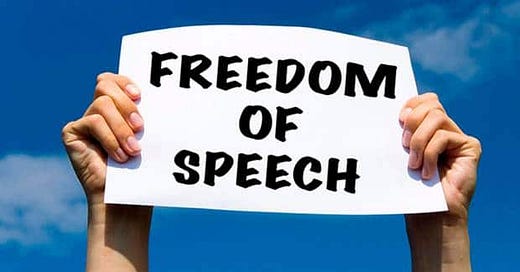If anyone believes free speech isn’t dead, it's fair to assume they’re incapable of noticing the world around them.
No longer in democracies can people speak freely against or criticise the actions of governments or policies of foreign nations if they’re committing crimes against humanity.
A voice and peaceful protests are now crimes against the state, while sending in squads of thugs to assault protesting students is legal.
Protesting university students worldwide have become targets of police efforts to quash their voices for humanity. From London to New York, and Sydney to Paris, students have established encampments within their universities.
Universities, which have traditionally been bastions of free speech and liberal thought, have now become battlegrounds of fierce debate over Israel’s actions, with students demanding an end to its mass slaughter and genocidal mania.
Worldwide throughout university encampments, the heavy-handed approach by police dressed in riot gear, using tear gas and batons against students, has raised serious concerns about the suppression of democratic rights in spaces meant to encourage debate and learning.
The police’s brutality represents a disturbing descent into authoritarianism, suggesting free speech is under direct assault by those in power.
What compounds the issue are powerful lobby groups like AIPAC. These groups wield considerable influence over US and other Western policies towards Israel, pressing universities and governments to crack down on pro-Palestinian protests. This not only stifles free expression but skews public perception and policy in favour of a single state's geopolitical agenda.
Reports of violent confrontations on campuses, facilitated by university administrations, fuel a narrative that campuses are no longer safe havens for free thought but instead arenas where ideological conformity is enforced through intimidation and violence.
Legislative measures targeting these movements exacerbate the crackdown on student protests. Laws categorising any criticism of Israeli policies as hate speech or anti-Semitism further complicate the issue, stifling free expression under the guise of combating discrimination.
The media’s coverage also plays a significant role, often focusing on isolated incidents of violence or framing the demonstrations as disruptive to public order. This undermines the legitimacy of the student movement and diverts attention from their message and the issue of police brutality.
Many countries have expressed concern over the treatment of protesters, calling for respect for human rights and safeguarding free speech. However, these statements often lack the force of action and do little to influence the policies of the governments involved.
Suppressing student protests has significant implications for global democracy. It signals an era where governments, influenced by powerful lobby groups, feel emboldened to quash dissent without significant domestic or international repercussions. This is an alarming trend for the future of society, particularly in shaping the participation of young people in democratic processes.
The aggressive measures taken by police and the pressures exerted by lobby groups illustrate a stark departure from democracy. The suppression of student voices on issues as critical as the Israeli-Palestinian conflict calls for a re-examination of what democratic values mean today. If students—tomorrow's leaders—are met with batons and legal threats for expressing their views, democratic engagement is at risk.
Lobby groups and their influence on public policy raise questions about whose interests are served. The overt crackdown on pro-Palestinian activism is an example of how external political pressures distort academic freedom and civil liberties.
Student encampments and the broader movement they represent are not just about a policy disagreement; they signify the systemic suppression of free speech, the militarisation of educational spaces, and the alarming power of lobbying groups to shape public debate. This trend suggests a perilous and rapid decline in free expression.
The widespread actions against student protesters indicate a disturbing trend towards curbing civil liberties and stifling critical voices. As the influence of powerful lobbies grows, the scope for free dialogue shrinks, raising concerns about the health of democratic institutions globally. However, the courage of students standing up offers hope.
Their determination to reclaim the right to speak and assemble freely is a powerful testament to the resilience of democracy, even in an increasingly hostile era.
The world’s response to these protests, from other students, academics, and some policymakers, has begun to form a network of solidarity that transcends borders and political systems. Yet, the future of this movement and the implications for global democracy remain uncertain.
If governments and influential lobby groups continue to suppress dissenting voices, the fight for a free and open society remains fraught with challenges.
The world must work now to rid itself of AIPAC and the Israeli Lobby Group’s influence or remain captive to their destructive racist control.





Thank you Jim. I’m sure the powers of evil can be defeated. People just have to wake up and bs prepared to enact it.
TrackAIPAC shows that 96 out of 100 senators are paid by AIPAC